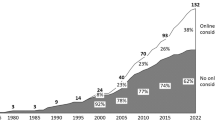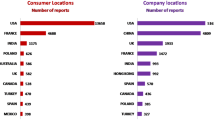Abstract
The legal framing of a firm’s pricing strategy can determine whether it constitutes online resale price maintenance (RPM) or online most favored nation (MFN). Together, cases that involve online RPM and MFN can be viewed as a natural experiment of how antitrust economics and law may adapt to an online world. Thus far, legal theories that have been inconsistent with economic theories have dictated enforcement across jurisdictions, which has led to confusion that thwarts potentially efficient business practices. This paper distinguishes issues of online RPM from traditional RPM and online RPM from online MFN. We apply the economics learning to RPM and analyze the antitrust cases of online RPM and MFN to date in the United States, Europe, and Australia. Finally, we offer policy recommendations that reduce the confusion in current legal doctrine.
Similar content being viewed by others
Notes
Dr. Miles Medical Co. v. John D. Park & Sons Co., 220 U.S. 373 (1911).
Leegin Creative Leather Products, Inc. v. PSKS, Inc., 551 U.S. 877 (2007).
Commission Regulation 330/2010 on the application of Article 101(3) of the Treaty of the Functioning of the European Union to categories of vertical agreements and concerted practices (April 20, 2010), OJ L 102/1 (“verticals block exemption regulation”). In the EU, block exemptions apply Article 101(3) TFEU to categories of agreements which satisfy the criteria of that provision as stipulated in the block exemption. Agreements satisfying the conditions in the block exemption can make use of the exemption in Article 101(3) TFEU saving the parties to the agreement from an individual case-by-case assessment of the compatibility of their agreement with Article 101(3) TFEU.
European Commission, Guidelines on Vertical Restraints, OJ C 130/1, (May 19, 2010), para 225.
See e.g., United States v. Colgate & Co., 250 U.S. 300 (1919).
Whether the restraint is treated as a horizontal or vertical one has significant legal implications in the EU due to the Verticals Block Exemption Regulation.
See Case COMP/AT.39847-E-books 12/12/2012 for the commitments from four publishers and Apple. See Case AT.39387—E-books 25/7/2013 for commitments from Penguin.
See OFT Decision Hotel Online Booking: Decision to Accept Commitments to Remove Certain Discounting Restrictions for Online Travel Agents, OFT1514dec, 31 January 2014 (Booking.com/Expedia/IHG) reversed on appeal in Skyscanner Ltd v Competition and Markets Authority [2014] CAT 16. For the announcement of the CMA’s closure of the investigation, see Press Release ‘CMA closes hotel online booking investigation’, 16 September 2015 available at https://www.gov.uk/government/news/cma-closes-hotel-online-booking-investigation.
Italian Competition Authority, Press Release, ‘Commitments offered by Booking.com Closed the Investigation in Italy, France, and Sweden’, 21 April 2015. On 1 July 2015, Expedia has voluntarily announced that it will apply the commitments that Booking.com offered and will abandon the use of parity clauses with its hotel partners for 5 years. See http://www.expediainc.com/news-release/?aid=123242&fid=99&yy=2015. Booking.com has also announced that it will apply the terms of the commitments that it entered into with the French, Italian, and Swedish NCAs to all its hotel partners in Europe; see Booking.com, Press Release, ‘Booking.com to Amend Parity Provisions throughout Europe’, Amsterdam, 25 June 2015, http://news.booking.com/bookingcom-to-amend-parity-provisions-throughout-europeesp.
Whether the relationship between a platform and a supplier is that of an agency relationship is a legal question with implications as to the applicability of Article 101/Sherman Act Section 1 to the agreements between such operators. For the argument that these relationships are indeed agency relationships and that consequently Article 101 is not applicable to the agreements between platforms and their suppliers, see Akman (2016).
See Bundeskartellamt, Press Release, ‘Bundeskartellamt Issues Statement of Objections Regarding Booking.com’s “Best Price” Clauses’, 2 April 2015. The other European countries in which these clauses are being/have been assessed from a competition law perspective are Austria, Switzerland, Ireland, Hungary, Poland, the Czech Republic, Denmark, Belgium, and Greece; see M Newman and L Crofts ‘Swiss to Wrap Up Hotel-Pricing Probe by Year-End’ MLex, 5 August 2015, and, L Crofts and M Newman ‘Booking.com, Expedia to Avoid Full Antitrust Scrutiny in Greece’ MLex, 22 September 2015.
See Article 133 of LOI no. 2015-990 du 6 août 2015 pour la croissance, l'activité et l'égalité des chances économiques (also known as ‘Macron Law’) banning restrictions on hoteliers’ pricing freedom.
See Parity Rate Al Rush Finale, 23 June 2016, available at http://www.federalberghi.it/comunicati/comunicati.aspx?IDEL=287 (accessed 1 September 2016).
Hovenkamp (1991).
Competition and Markets Authority, Private Motor Insurance Market Investigation Final Report (2014), https://assets.publishing.service.gov.uk/media/5421c2ade5274a1314000001/Final_report.pdf, §§8.85–8.102.
CMA ‘Private Motor Insurance Market Investigation Order 2015’ (18 March 2015) available at https://assets.digital.cabinet-office.gov.uk/media/5509879f40f0b613e6000029/Order.pdf.
Bundeskartellamt, Case Report, Amazon removes price parity obligation for retailers on its Marketplace platform, B6-46/12, 9 December 2013, available at http://www.bundeskartellamt.de/SharedDocs/Entscheidung/EN/Fallberichte/Kartellverbot/2013/B6-46-12.pdf?__blob=publicationFile&v=2
Decision of the Office of Fair Trading, Mobility scooters supplied by Pride Mobility Products Limited: prohibition on online advertising of prices below Pride’s RRP, CE/9578-12, 27 March 2014 available at https://assets.publishing.service.gov.uk/media/54522051ed915d1380000007/Pride_Decision_Confidential_Version.pdf.
See Verticals Block Exemption Regulation Article 4(a).
Decision of the Competition and Markets Authority, Online resale price maintenance in the bathroom fittings sector, CE/9857-14, 10 May 2016 available at https://assets.publishing.service.gov.uk/media/573b150740f0b6155b00000a/bathroom-fittings-sector-non-conf-decision.pdf.
The CMA indeed has the power to address decisions to fewer than all of the relevant parties. See The Competition Act 1998 (Competition and Markets Authority’s Rules) Order 2014, Statutory Instrument 2014/458, Article 10(2).
Decision of the Competition and Markets Authority, Online resale price maintenance in the commercial refrigeration sector, CE/9856/14, 24 May 2016 available at https://assets.publishing.service.gov.uk/media/575a8f5eed915d3d24000003/commercial-catering-equipment-non-confidential-decision.pdf.
ACCC (5 December 2014) ACCC authorises minimum retail prices on Festool power tools.
ACCC v ANZ [2013] FCA 1206 (finding in favor of the parties); ACCC v ANZ [2015] FCAFC 103 (dismissing the ACCC’s appeal).
On the MFN issue Australia has settled with Bookings.com and Expedia to allow only narrow MFNs along the European model.
ACCC v Flight Centre Limited (No 2) [2013] FCA 1313.
Id. at para 17.
Australian Competition and Consumer Commission v. Flight Centre Limited (No 3) [2014] FCA 292.
References
Akman, P. (2016). A competition law assessment of platform most-favored-customer clauses. Journal of Competition Law and Economics, 12(4), 781–833.
Asker, J., & Bar-Isaac, H. (2014). Raising retailers’ profits: On vertical practices and the exclusion of rivals. American Economic Review, 104(2), 672–686.
Baker, J. B. (1996). Vertical restraints with horizontal consequences: Competitive effects of “Most-Favoured-Customer” clauses. Antitrust Law Journal, 64, 517–534.
Blair, R. D., & Haynes, J. S. (2010). The plight of online retailers in the aftermath of Leegin: An economic analysis. Antitrust Bulletin, 55(1), 245–269.
Boik, A., & Corts, K. S. (2016). The effects of platform most-favored-nation clauses on competition and entry. Journal of Law and Economics, 59(1), 105–134.
Bonnet, C., & Dubois, P. (2010). Inferences on vertical contracts between manufacturers and retailers allowing for nonlinear pricing and resale price maintenance. RAND Journal of Economics, 41(1), 139–164.
Breit, W. (1991). What do economists know and when did they know it? Journal of Institutional and Theoretical Economics, 147(1), 72–90.
Buccirossi, P. (2013). Background note, OECD policy roundtables, vertical restraints for on-line sales, DAF/COMP(2013)13.
Buccirossi, P. (2015). Parity clauses: Economic incentives, theories of harm and efficiency justifications. Competition Law & Policy Debate, 1(3), 43–52.
Carlton, D., & Chevalier, J. (2001). Free Riding and Sales Strategies for the Internet. Journal of Industrial Economics, 49, 441–461.
Cooper, J., Froeb, L., O’Brien, D., & Vita, M. (2005). Vertical antitrust policy as a problem of inference. International Journal of Industrial Organization, 23, 639–664.
Corts, K. S. (1995). On the robustness of the argument that price-matching is anti-competitive. Economics Letters, 47(3), 417–421.
Corts, K. S. (1997). On the competitive effects of price-matching policies. International Journal of Industrial Organization, 15(3), 283–299.
Elzinga, K. G., & Mills, D. E. (2008). The economics of resale price maintenance. In 3 Issues in competition law and policy 1841 (ABA Section of Antitrust Law 2008).
Fletcher, A., & Hviid, M. (2014). Retail price MFNs: Are they RPM “at its worst”? ESRC Centre for Competition Policy Working Paper 14-5.
Foros, O., Kind, H. J., & Shaffer, G. (2010). Resale price maintenance and restrictions on dominant firm and industry-wide adoption. International Journal of Industrial Organization, 29(2), 179–186.
Foros, O., Kind, H. J., & Shaffer, G. (2013). Turning the page on business formats for digital platforms: Does Apple’s agency model soften competition? CESifo Working Paper No. 4362.
Hovenkamp, H. (1991). Enterprise and American Law, 1836–1937. Cambridge, MA: Harvard University Press.
Hviid, M. (2015). Vertical agreements between suppliers and retailers that specify a relative price relationship between competing products or competing retailers. Background Note, OECD Hearing on Across Platform Parity Agreements, DAF/COMP(2015)6.
Johansen, B. O., & Vergé, T. (2016). Platform price parity clauses with direct sales. Working paper.
Johnson, J. P. (2013). The agency and wholesale models in electronic content markets. Working paper. http://papers.ssrn.com/sol3/papers.cfm?abstract_id=2126808.
Johnson, J. P. (2014). The agency model and MFN clauses. Working paper. http://dx.doi.org/10.2139/ssrn.2217849.
Jullien, B., & Rey, P. (2007). Resale price maintenance and collusion. RAND Journal of Economics, 38, 983–1001.
Kirkwood, J. B. (2014). Collusion to control a powerful customer: Amazon, E-books, and antitrust policy. University of Miami Law Review, 69, 1–64.
Klein, B. (2014). Resale price maintenance of online retailing. In R. D. Blair & D. Daniel Sokol (Eds.), Oxford handbook of international antitrust economics (Vol. 2). New York: Oxford University Press.
Klein, B., & Murphy, K. M. (1988). Vertical restraints as contract enforcement mechanisms. Journal of Law and Economics, 31(2), 265–297.
LEAR (2012). A report prepared for the OFT by LEAR: Can ‘Fair’ prices be unfair? A Review of Price Relationship Agreements. OFT1438.
Levenstein, M. C., & Suslow, V. Y. (2014). How do cartels use vertical restraints? Reflections on Bork’s The Antitrust Paradox. Journal of Law and Economics, 57(S3), S33–S50.
Liu, L., Yu, H., & Chen, Y. (2016). The strategic provision of parallel evaluation tools by online platforms. Working paper.
Mallapragada, G., Chandukala, S. R., & Liu, Q. (2016). Exploring the effects of “What” (product) and “Where” (website) characteristics on online shopping behavior. Journal of Marketing, 80(2), 21–38.
Marvel, H. P., & McCafferty, S. (1984). Resale price maintenance and quality certification. RAND Journal of Economic, 15(3), 346–359.
OECD (2013). Policy roundtables, vertical restraints for on-line sales, DAF/COMP(2013)13.
Rey, P., & Vergé, T. (2010). Resale price maintenance and interlocking relationships. Journal of Industrial Economics, 58(4), 928–961.
Salop, S. C., & Scott Morton, F. (2013). Developing an administrable MFN enforcement policy. Antitrust, 27(2), 15–19.
Shaffer, G. (1991). Slotting allowances and resale price maintenance: A comparison of facilitating practices. RAND Journal of Economics, 22(1), 120–135.
Spengler, J. J. (1950). Vertical integration and antitrust policy. Journal of Political Economy, 58(4), 347–352.
Telser, L. G. (1960). Why should manufacturers want fair trade? Journal of Law and Economics, 3, 86–105.
van Baal, S., & Dach, C. (2005). Free riding and customer retention across retailers’ channels. Journal of Interactive Marketing, 19(2), 75–85.
Winter, R. (1993). Vertical control and price vs. non-price competition. Quarterly Journal of Economics, 108(1), 61–76.
Wu, C., Wang, K., & Zhu, T. (2015). Can price matching defeat showrooming? Working paper.
Cases cited
Dr. Miles Medical Co. v. John D. Park & Sons Co., 220 U.S. 373 (1911).
Leegin Creative Leather Products, Inc. v. PSKS, Inc., 551 U.S. 877 (2007).
United States v. Colgate & Co., 250 U.S. 300 (1919).
ACCC v ANZ [2013] FCA 1206.
ACCC v ANZ [2015] FCAFC 103.
ACCC v Flight Centre Limited (No 2) [2013] FCA 1313.
Australian Competition and Consumer Commission v. Flight Centre Limited (No 3) [2014] FCA 292.
Australian Competition & Consumer Commission v. Flight Centre Travel Group Limited, Case B15/2016.
Author information
Authors and Affiliations
Corresponding author
Rights and permissions
About this article
Cite this article
Akman, P., Daniel Sokol, D. Online RPM and MFN Under Antitrust Law and Economics. Rev Ind Organ 50, 133–151 (2017). https://doi.org/10.1007/s11151-016-9560-x
Published:
Issue Date:
DOI: https://doi.org/10.1007/s11151-016-9560-x




